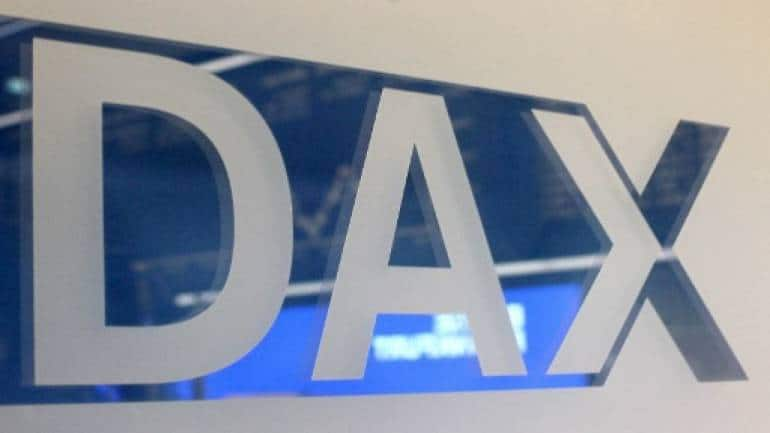German DAX index breaches 16,000 mark for first time
 ]
]
Source: AFP
Germany’s bluechip stocks index on Friday breached 16,000 points for the first time following more record highs on Wall Street overnight as investors shrugged off data showing fresh US inflation pressures.
A jump in wholesale prices added to expectations the Federal Reserve will shift course and pull back on its stimulus efforts, starting with a slowdown in the pace of massive bond buying.
“For now, markets appear… comfortable with that idea,” noted Michael Hewson, chief market analyst at CMC Markets.
“As long as the discussion doesn’t move onto the more sensitive topic of rate rises, then the current trend of… (stock market) highs looks set to continue.”
In Germany, Frankfurt’s DAX 30 index hit a record high of 16,030 points in Friday morning deals.
The first signal of a move to taper huge US stimulus could come as soon as this month when Federal Reserve chief Jerome Powell is due address the annual central banking conference in Jackson Hole, Wyoming.
The worry is that tapering, along with rises to interest rates to contain inflation as economies reopen from lockdowns, could hamper the recovery.
Elsewhere Friday, Asian stock markets closed lower following a broadly positive week.
The fast-spreading Delta virus variant, which is forcing governments to reimpose containment measures, and the Chinese government’s campaign to tighten its grip on the world’s number two economy were also playing on sentiment.
Data on Thursday showed US producer prices rose more than twice as much as forecast on-month in July, while the annual rate hit a record.
The producer price report came on the heels of Wednesday’s consumer price index which showed inflation moderating in July.
“Global investors are assessing the implications of the spread of the Delta virus, the possible tapering by the Fed, and China’s clampdown,” said Geir Lode, of Federated Hermes.
“With equity markets almost doubling since the start of the pandemic and a bull market lasting over a decade, investors are questioning how far the bull market can rally.”
Investors were keeping an eye also on developments in China after officials said they would put in place tougher anti-monopoly rules and penalties over the next five years, as Beijing looks to tighten the screw further after a recent crackdown on a range of industries.
Tech and private equity firms have already been caught in the crosshairs of leaders, and a statement late Wednesday indicated finance, public health, and food and drug manufacturing would also be targeted.
Elsewhere, crude prices extended their recent sell-off fuelled by concerns that the Delta mutation would slam demand, with the International Energy Agency warning as much in a report Thursday.
“The oil market will likely continue to maintain a nervous watch, especially for a deterioration in China and the US,” said Vandana Hari, of energy consultant Vanda Insights, adding that the IEA report “validated fears over a slowdown in second-half demand”.
Key figures around 0915 GMT
Frankfurt - DAX 30: UP 0.5 percent at 16,023.76 points
London - FTSE 100: UP 0.4 percent at 7,221.35
Paris - CAC 40: UP 0.4 percent at 6,908.29
EURO STOXX 50: UP 0.3 percent at 4,238.78
Tokyo - Nikkei 225: DOWN 0.1 percent at 27,977.15 (close)
Hong Kong - Hang Seng Index: DOWN 0.5 percent at 26,391.62 (close)
Shanghai - Composite: DOWN 0.2 percent at 3,516.30 (close)
New York - Dow: UP less than 0.1 percent at 35,499.85 (close)
Euro/dollar: UP at $1.1741 from $1.1733 at 2100 GMT
Pound/dollar: DOWN at $1.3803 from $1.3809
Euro/pound: UP at 85.08 pence from 84.94 pence
Dollar/yen: DOWN at 110.29 yen from 110.43 yen
West Texas Intermediate: DOWN 0.6 percent at $68.67 per barrel
Brent North Sea crude: DOWN 0.1 percent at $71.22 per barrel
World markets tank on Fed taper talk, Delta fears
 ]
]
Global stocks and oil markets tanked Thursday but the dollar rallied versus some key rivals after the US Federal Reserve signalled it could rein in vast stimulus measures this year.
Sentiment was hammered also by the rapid global spread of the coronavirus Delta variant, signs of Chinese economic weakness and the Taliban’s takeover of Afghanistan.
AJ Bell investment director Russ Mould pointed to “a cocktail of worries” across financial markets.
“The question now is whether a volatile week is the prelude to the kind of late summer sell-off we have seen in previous years.”
In late morning deals, Paris’ main stocks index briefly tumbled 3.0 percent before paring losses, with the luxury sector hit by demand worries amid concerns especially over China’s stumbling economic recovery.
The Frankfurt and London indices also slid, mirroring Asia’s weak performance after a second straight day of losses on Wall Street.
Minutes from the Fed’s most recent July gathering showed most board members agree on tapering monetary policy in the next few months, sending shockwaves reverberating across trading floors.
Stronger dollar
The dollar however strengthened against the euro and pound on talk of tapering being followed by higher US interest rates, according to analysts.
The rising US unit weighed on dollar-priced oil, which slumped by more than 3.0 percent also on weaker demand expectations amid rising virus fears, notably in commodities-hungry China.
“Concerns about dampening demand expectations as a result of an increase in coronavirus cases worldwide have contributed to the drop” in oil, said AvaTrade analyst Naeem Aslam.
“The rise in the dollar… has added to the downside pressure.”
And after chalking up record highs on numerous occasions in recent weeks, New York’s main stocks indices ended in the red again Wednesday after most Fed members agreed on tapering monetary policy in the next few months.
It comes as a string of data shows the world’s top economy well on the road to recovery.
“Nerves are clearly rising around the Delta variant and the timing of the Fed’s taper, but I don’t think we learned anything from the minutes on Wednesday that warrants” the big sell-offs, said Oanda analyst Craig Erlam, adding they simply confirmed market expectations.
Key figures around 1045 GMT
London - FTSE 100: DOWN 2.0 percent at 7,029.13 points
Frankfurt - DAX 30: DOWN 1.7 percent at 15,699.48
Paris - CAC 40: DOWN 2.5 percent at 6,604.50
EURO STOXX 50: DOWN 1.9 percent at 4,108.75
Tokyo - Nikkei 225: DOWN 1.1 percent at 27,281.17 (close)
Hong Kong - Hang Seng Index: DOWN 2.1 percent at 25,316.33 (close)
Shanghai - Composite: DOWN 0.6 percent at 3,465.55 (close)
New York - Dow: DOWN 1.1 percent at 34,960.69 (close)
Euro/dollar: DOWN at $1.1693 from $1.1711
Pound/dollar: DOWN at $1.3689 from $1.3756
Euro/pound: UP at 85.41 pence from 85.13 pence
Dollar/yen: DOWN at 109.67 yen from 109.77 yen
West Texas Intermediate: DOWN 3.7 percent at $63.05 per barrel
Brent North Sea crude: DOWN 3.2 percent at $66.07 per barrel
Indian equities outperform global peers, Nifty50 surges 18% YTD; will the trend continue?
 ]
]
Indian equity markets staged strong show not only in the last one year but also year-to-date (2021), which is attributable to recovery in growth factors especially after easing Covid-led restrictions, healthy earnings, government and RBI measures, and ample of global liquidity.
The Nifty50 shot up 17.95 percent from the January till August 13, 2021, driven largely by infrastructure, IT, Metals, Energy, Auto and Banking & Financial stocks.
The benchmark index surpassed 16,500 mark for the first time today, hitting a fresh record high of 16,543.60, indicating the month of August is very strong especially after the states in India further eased restrictions which is ultimately expected to boost the further recovery in the economy as well as earnings.
In the same period (YTD), global indices namely Dow Jones Industrial Average surged 15.99 percent, Nasdaq Composite gained 14.96 percent, DAX was up 16.29 percent, FTSE 100 gained 11.65 percent, Kospi was up 10.36 percent, Nikkei 225 up 1.94 percent and Shanghai Composite up 1.24 percent.
“The markets are a function of earnings in the long term and liquidity in the near term. Move away from physical assets and low fixed income rates is leading to significant flow into equities. There is no sign that this migration is going to change anytime soon. This is the short term perspective,” Susmit Patodia, Director, Portfolio Manager at Motilal Oswal Asset Management Company told Moneycontrol.
“Longer term, earnings have been extremely strong as well. We have been in an upgrade cycle for nearly last 4 quarters which has not happened in the last 10 years,” he said.
The Indian index Nifty50, however, underperformed only two major indices which are S&P500 that gained 18.76 percent and CAC 40 that rallied 24.17 percent.
All the central banks so far decided to keep the rates low and maintain the liquidity flow till the consistency in global economic growth, though they are keeping in mind the risk of Covid-19 waves.
“The recovery remains uneven across sectors and needs to be supported by all policy makers. The Reserve Bank remains in “whatever it takes” mode, with a readiness to deploy all its policy levers - monetary, prudential or regulatory. In parallel, our focus on preservation of financial stability continues. At this juncture, our overarching priority is that growth impulses are nurtured to ensure a durable recovery along a sustainable growth path with stability,” said the RBI Governor, Shaktikanta Das in its monetary policy meeting.
Going ahead experts feel the momentum is expected to be supported by the strong earnings activity, flow of liquidity and expected nearly double digit economic growth in FY22.
“Equity valuations are ahead of their fundamentals owing to the signs of growth recovery, government spending and healthy demand outlook from rural economy. This combined with healthy liquidity conditions leads to exuberance in markets and hence, the current rally,” said Rajesh Cheruvu, Chief Investment Officer at Validus Wealth.
Prasun Gajri - Chief Investment Officer at HDFC Life feels while the markets may continue their upward move, what matters, in the end, is the nature of the underlying portfolio as the fundamentals eventually catch up.
- “It is always important to focus on individual stocks and not just on the aggregate market indices. In the current market where stocks across the spectrum are moving up, it becomes doubly important to focus on stocks where the fundamentals are strong and the business models are robust,” he said.
-
The views and investment tips expressed by investment expert on Moneycontrol.com are his own and not that of the website or its management. Moneycontrol.com advises users to check with certified experts before taking any investment decisions.